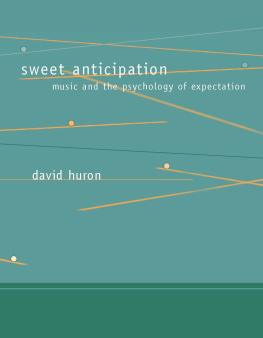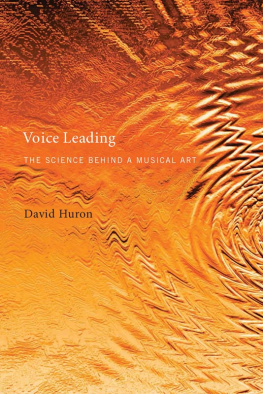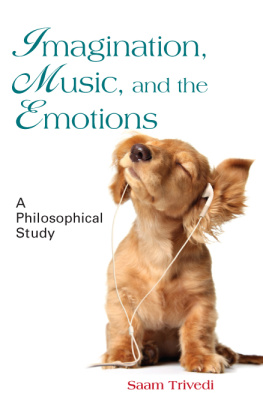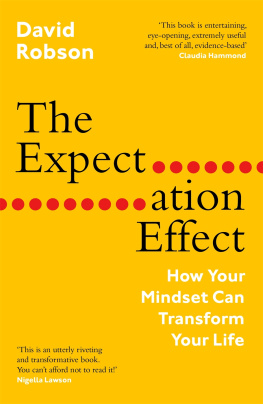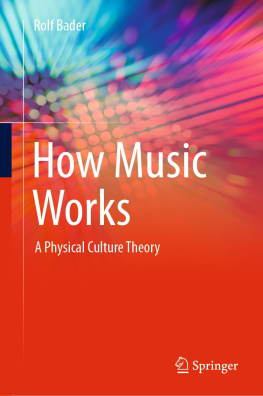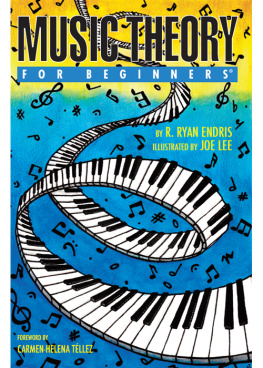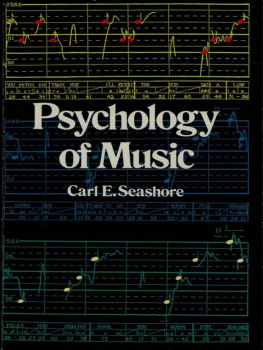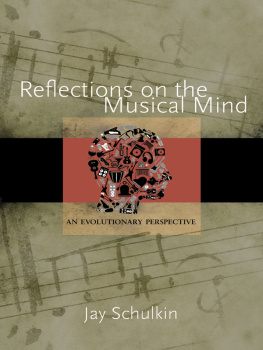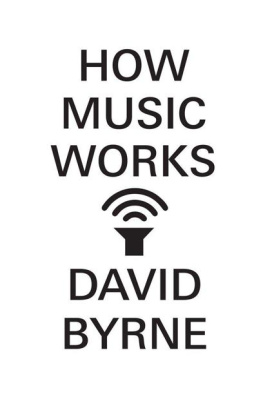Sweet Anticipation
music and the psychology of expectation
David Huron
A Bradford Book
The MIT Press
Cambridge, Massachusetts
London, England
2006 Massachusetts Institute of Technology
All rights reserved. No part of this book may be reproduced in any form by any electronic or mechanical means (including photocopying, recording, or information storage and retrieval) without permission in writing from the publisher.
MIT Press books may be purchased at special quantity discounts for business or sales promotional use. For information, please email or write to Special Sales Department, The MIT Press, 55 Hayward Street, Cambridge, MA 02142.
This book was set in Stone Sans and Stone Serif by SNP Best-set Typesetter Ltd., Hong Kong, and was printed and bound in the United States of America.
Library of Congress Cataloging-in-Publication Data
Huron, David.
Sweet anticipation : music and the psychology of expectation / David Huron.
p. cm.
A Bradford book.
Includes bibliographical references (p. ) and index.
ISBN 0-262-08345-0 (hc : alk. paper)
1. MusicPsychological aspects. 2. Expectation (Psychology). I. Title.
ML3838.H87 2006 78111.dc22 2005054013
10 9 8 7 6 5 4 3 2 1
Contents
Preface
This book describes a psychological theory of expectation. I call it the ITPRA theory a name that will be explained in the first chapter. When I began this research, my interests were limited to music. I was aiming to better understand how listeners form music-related expectations, and how these expectations might account for various emotional responses. As the work progressed, the ITPRA theory evolved into a general theory of expectation and so expanded beyond my parochial concerns about music. Although my principal motivations remain musical, this book should prove informative to a more general audience of readers interested in cognitive science and evolutionary psychology.
For musicians and music scholars, this book offers psychologically based insights into such venerable topics as meter, syncopation, cadence, tonality, atonality, and form. Detailed accounts of musical tension, deception, and surprise are given, and I suggest how music is able to evoke emotions such as spine-tingling chills and musically induced laughter. I provide moment-by-moment analyses of the psychological effects of common musical devices such as the appoggiatura, suspension, and anticipation, and discuss the role of expectation in crafting effective performance interpretations. In addition, I suggest how the organization of the brain might account for the taken-for-granted aesthetic distinctions of work , genre , and rendition . The book offers psychological interpretations of various historical events in Western music, notably the advent of musical modernism as exemplified in the works of Wagner, Stravinsky, and Schoenberg. Finally, I speculate about how the psychology of expectation might be exploited to create entirely novel musics. In general, the book attempts to show how both biology and culture contribute to the subjective phenomenal experiences that make listening to music such a source of pleasure.
For psychologists and cognitive scientists, this book offers a general theory of expectation. I suggest how the phenomenon of surprise can lead to fear, laughter, frisson, or awe. I endeavor to reconcile competing theories of emotion, most notably cognitive appraisal theories with physiologically inspired theories such as the James-Lange theory. Along the way, I propose a new interpretation of the Mere Exposure effect and suggest that misattribution is an artifact of the biological worlds response to the problem of induction. An important part of the book deals with the origin of auditory expectations. In general, the experimental evidence reported here supports the emerging consensus for statistical learning. Finally, I address the problem of how expectations are mentally represented. I note that the apparently chaotic patterns found in the research on musical development are consistent with neural Darwinist theories. I further note that the differences between innate and learned representations (such as those observed in auditory localization) can be explained by the Baldwin effect. In general, I attempt to tell an uninterrupted story, from the patterns of the objective world, through imperfectly learned heuristics used for predicting that world, to the phenomenal qualia we experience as we apprehend the world.
In retrospect, music provided me with a serendipitous starting place for theorizing more generally about the psychology of expectation, I think for three reasons: First, most everyday experiences are too complicated to provide fruitful cases for analysis. For example, one of the most important expectation-related experiences is surprise. Unfortunately, many of the surprises that people experience involve complex social contexts that are often difficult to interpret. Even the simple peek-a-boo surprise between parent and infant involves a social dynamic that makes it hard to study. Although music is not simple, there are often fewer confounding factors to consider. A second advantage is that many musicians actively seek to provoke emotional responses in their listeners. Although different musicians pursue different goals, manipulating expectations has been a common technique used to create an emotional effect. In general, without manipulation, causality is difficult to infer; so this aspect of music often provides helpful clues about the cascade of causal events. Finally, music typically provides detailed records (in the form of notated scores) that chronicle the precipitating events as they unfold in time. Musical scores provide a convenient database for testing specific hypotheses about expectation. In short, music offers a number of advantages as a case study of the psychology of expectation. My hope is that psychologists will find the theory engaging, even if they have no interest in music.
While my main audience is intended to be musicians, I have tried to make the underlying theory of expectation accessible to nonmusician readers. Where possible, I have bracketed the technical musical descriptions as independent chapters. In chapters 1 and 2 the theory itself is described in general terms with little reference to music. Chapter 3 describes the experimental methods used to study the phenomenon of expectation. Chapters 4, 5, and 6 identify five general patterns of expectation exhibited by listeners familiar with Western music. Chapters 7, 8, 11, and 12 expand on the basic theory. While the theory itself is described in general terms, the illustrations in these chapters are drawn almost entirely from the field of music. Parallel examples in visual perception, linguistics, social behavior, and ethology will readily come to mind for those readers who are knowledgeable in such areas. Nonmusicians may wish to skip the applied discussion of music, especially chapters 9, 10, and 13 to 16. The concluding chapter (17) provides an analytic summary of the basic theory.
For readers who dont read music, the notational examples may feel irksome or irrelevant. Let me assure readers that the musical examples are genuinely illustrative. The examples have been field tested, and for most listeners they evoke fairly reliable phenomenal experiences. To help readers grasp them more fully, recorded versions of all of the notated examples are available on the World Wide Web.1 Professional musicians themselves may want to refer to the recorded examples since they often include performance nuances that enhance the effect.

